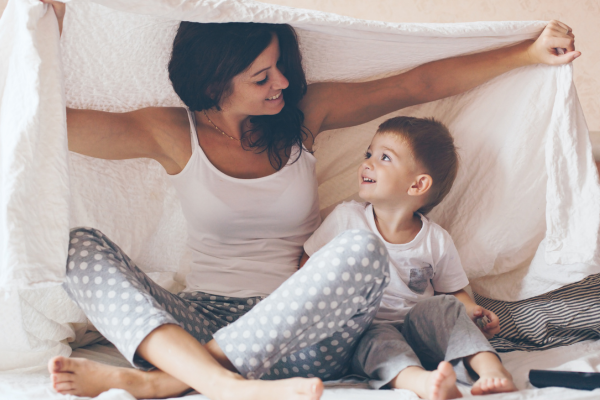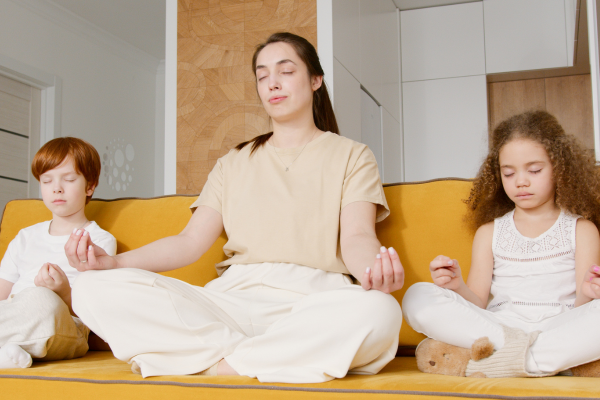
Sleep is super important for kids—it helps them grow, think, and handle their emotions. But for children with ADHD, sleep can feel like an impossible challenge. Did you know that up to half of kids with ADHD struggle with sleep problems? That’s a lot of restless nights! It is important to know how to tackle these sleep issues to help kids (and parents) get the rest they deserve.
Why Do ADHD and Sleep Issues Go Hand-in-Hand?
Kids with ADHD often have a tough time settling down during the day because they’re full of energy, constantly moving, and easily distracted. Well, the same thing happens at night. Their minds and bodies can stay revved up long after bedtime. Racing thoughts, anxiety, or feeling restless can make it really hard to relax and fall asleep.
Common Sleep Struggles for Kids with ADHD
Here are some of the most common sleep challenges faced by kids with ADHD:
- Trouble Falling Asleep: Their brains are still in “go-go-go” mode at bedtime, making it tough to settle down.
- Restless Sleep: Tossing and turning all night long means they don’t get that deep, refreshing sleep they need.
- Waking Up at Night: Some kids wake up in the middle of the night and struggle to get back to sleep.
- Feeling Tired During the Day: Even though they’re hyperactive, kids with ADHD can still feel exhausted due to poor sleep.
- Sleep Apnea: In rare cases, kids with ADHD may also have sleep apnea, which causes interrupted breathing during the night.

Lack of sleep makes ADHD symptoms even worse. A tired brain struggles even more with attention and self-control. As a result, a child who hasn’t slept well may seem more irritable, forgetful, and impulsive than usual. They might also get frustrated more easily and have trouble staying on task.
When a child with ADHD is running on empty, it’s harder for them to follow directions, sit still, or pay attention. This can also lead to more disruptions in the classroom, falling behind academically, and even conflicts with teachers or peers.
Social situations can also become tricky—tired kids are more likely to snap at their friends or misread social cues, which can lead to misunderstandings and hurt feelings.
And here’s where the vicious cycle kicks in: ADHD makes it harder to sleep because kids may struggle to wind down at night. They might lie awake, their minds racing, or feel restless in bed. Then, the next day, sleep deprivation makes their ADHD symptoms worse, leading to even more challenges falling asleep the next night.

Tips for Better Sleep: Let's Make Bedtime Easier!
It’s essential to figure out whether a child’s behavior is being driven by their ADHD, their lack of sleep, or both. From there, we can create a personalized plan—to help the child get the rest they need and feel more in control of their day.
- Set Up a Relaxing Bedtime Routine
Kids with ADHD thrive on routines. Having a consistent bedtime helps their bodies know when it’s time to calm down. Keep the routine predictable—whether it’s reading a book, listening to soft music, or doing some breathing exercises, it helps them unwind and prepare for sleep. - Make the Bedroom a Sleep-Friendly Zone
The right environment can work wonders for sleep. A cool, dark, and quiet room sets the stage for good rest. Keep distractions like TVs, tablets, and phones out of the bedroom to avoid any overstimulation. - Encourage Physical Activity
Exercise is great for improving sleep quality! Just make sure the activity happens earlier in the day—too close to bedtime, and it might actually keep them awake. - Try Behavioral Sleep Strategies
Cognitive-behavioral therapy for insomnia (CBT-I) can be a game-changer. This therapy helps kids replace bad sleep habits with healthy ones, helping them learn how to sleep better through positive thinking and behaviors. - Teach Relaxation Techniques
Mindfulness, deep breathing, and guided imagery are awesome tools to help kids calm their minds before bed. These techniques can be especially helpful for kids who have racing thoughts or anxiety.

ADHD and sleep problems are often intertwined, but with the right strategies, we can break the cycle! By working together—we can help kids develop healthy sleep habits that improve not only their rest but also their ADHD symptoms.
Visit our website, www.oneintervention.org, to access a wealth of resources on early childhood development. We believe that every child deserves the chance to reach their full potential. You can also find us on Instagram and Facebook @oneintervention

